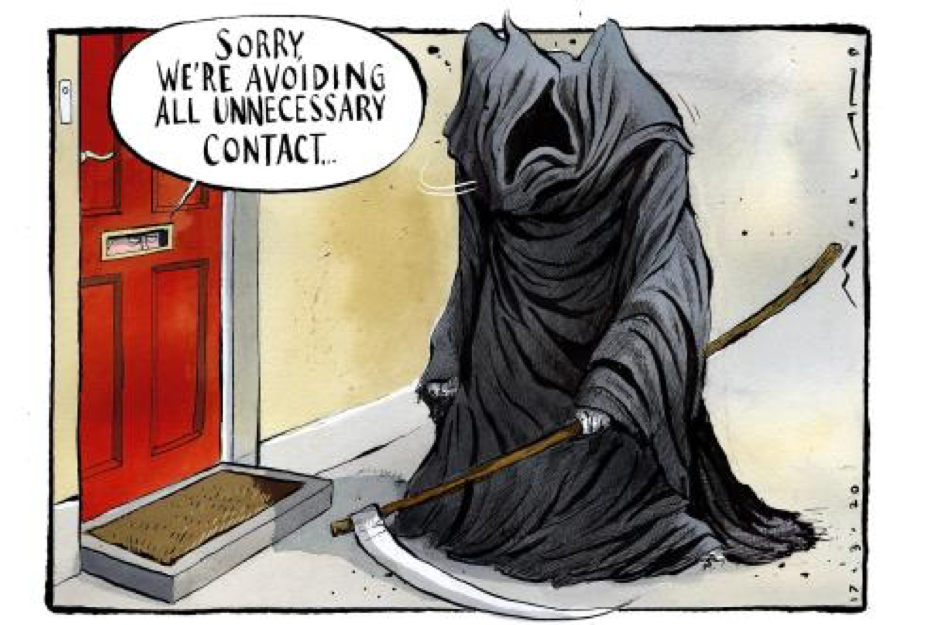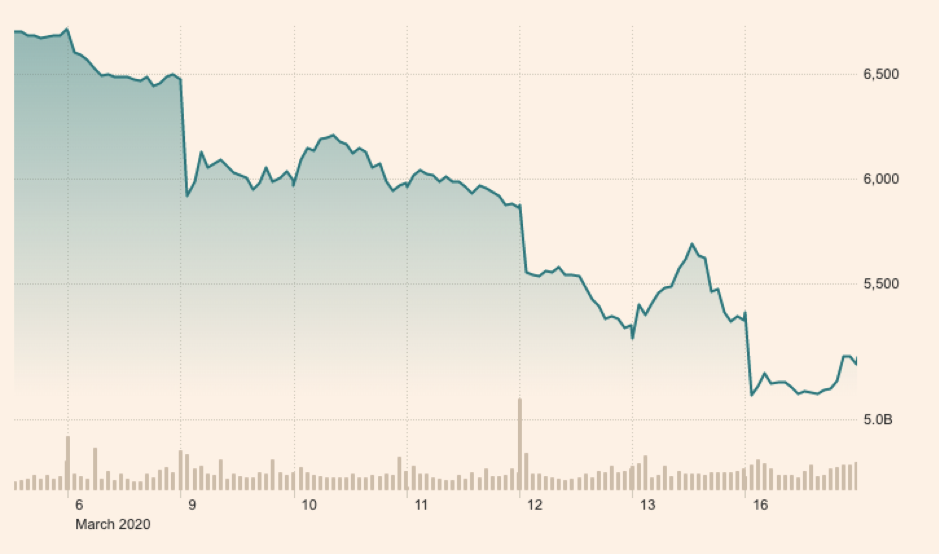- Charlotte Street Partners

- Mar 17, 2020
- 6 min read
A lockdown with no locks (for now)
Written by Scarlett Regan, Researcher
Edited by David Gaffney, Partner
Good morning,
I write this from my desk at home, with the talking heads of the rolling news channels as my far-from-encouraging colleagues. Yesterday afternoon, prime minister Boris Johnson held the first of his now daily afternoon news conferences announcing a number of new measures to help fight the spread of the coronavirus in the UK. The shocking new statistic is that in a worst-case scenario with few interventions, 250,000 people could die. In this context, Johnson strongly recommended the behaviours many of us have been practicing already: stop non-essential contact with others, work from home if you can, avoid unnecessary travel, and don’t visit the pub, the gym, theatres or restaurants. The advice for those displaying any symptoms who live alone is to stay at home for seven days. If you live with others, you and your whole household should stay at home for 14 days. Johnson, flanked by chief medical officer Chris Whitty and chief scientific adviser Sir Patrick Vallance, also extended the definition of “vulnerable” to pregnant women and advised a 12-week quarantine for them, the over 70s and anyone with underlying health conditions. Describing the measures as “perhaps appearing to be excessive”, the prime minister seemed oblivious to the increasingly noisy opinion that they do not, in fact, go far enough. The UK is thus far taking a softer line than many other countries with no curfews, no enforced quarantine, nor mandatory closure of hospitality or leisure businesses yet. Of course, not all countries have the same political system, same institutional governance, same demographics, same population distribution, same geography, same economy, same disease burden, same disease vectors, same cultural and social norms, same health and care system, the same people. None of this is straightforward; there are no one-size-fits-all solutions. For now, the onus is on the compliance of each of us as good citizens, and sticking together is what we must do, as Professor Paul Gray wrote here yesterday. The businesses most affected have cried foul, given that they can only claim insurance if they are ordered to close, whereas the current situation will simply starve them of customers and revenue. The chancellor, Rishi Sunak, may well find himself on the panel at today’s press conference as pressure mounts on the government to support the hospitality industry and small businesses more generally. Very soon, the prime minister will have to contend with the economic crisis that will follow the public health crisis. It’s a delicate balancing act and the stakes could not be higher. At some point, you imagine, the state will have to get much more tough, and much more generous.
News
The European Commission is planning to ban all non-essential travel throughout Europe’s Schengen free travel zone, in an attempt to limit the spread of coronavirus. Long-term residents, family members and diplomats would be exempt, as well as cross-border and healthcare workers, and those transporting goods. Leaders are due to announce these measures today. The BBC has delayed the licence fee changes for over-75s, due to fears about the virus. The date has been pushed back from 1 June to 1 August. The move respects that those over the age of 70 are now increasingly dependent on the BBC for information, particularly if they have to self-isolate. In the US, the first human trial of a vaccine to protect against the coronavirus has started, with four patients receiving the jab yesterday in Seattle. Experts say it will take months before they know if this vaccine will be effective.
Business and economy
The tech giant Apple has been fined €1.1bn by antitrust regulators in France for engaging in anti-competitive agreements with two wholesalers. By agreeing not to compete against each other, they sterilised the wholesale market for Apple products. The two other companies – Tech Data and Ingram Micro – were also fined. The largest supermarkets in the UK are considering cutting café counters and other services to focus on maintaining essential items and hygiene products. This comes after supermarkets including Sainsbury’s, Tesco, Asda and Morrisons wrote an open letter to customers, urging them to stop stockpiling goods. The ecommerce giant Amazon has announced that it will hire 100,000 extra staff across the world to handle the surge in demand caused by the pandemic. Reaching out to hospitality workers who are likely to lose their jobs, Amazon will increase the hourly wage for workers until at least the end of April. (£)
Columns of note
In The Telegraph, William Hague expresses that the lack of international coordination is the most striking aspect of this crisis. The huge disparity between the measures taken by China, the US and Europe has revealed that collaboration between world leaders is extremely low, Hague argues. Why don’t the G20 nations meet to discuss their strategies? Why don’t we step up our ventilator production on a global scale, using the best-equipped industries from across the world? Isolation is not the answer. Coordination and cooperation, however, is. (£) In The Guardian, Devi Stridhar, chair of global public health at the University of Edinburgh, argues that Britain must change its course and resume testing to protect its frontline NHS staff. She praises countries such as Singapore and Hong Kong, which acted early in the crisis to stop the virus from spreading. Stridhar outlines three steps of “decisive action” that she believes we should be taking, echoing the WHO director general’s urge to “test, test, test” yesterday.

Source: The Times
Markets
What happened yesterday?
In the US, the S&P 500 index fell 12% yesterday, despite the Federal Reserve’s emergency interest rate cut on Sunday. This marked the biggest single-day loss since the October 1987 crash. Nasdaq Composite had its worst day ever, down 12.3%. These results came as increasingly drastic advice was given, across the globe, in an effort to slow the spread of the coronavirus. Several countries are announcing that they are closing their international borders. The UK’s FTSE 100 fell 4.7% to its lowest level since 2011, making its year-to-date losses more than 30%. The Stoxx Europe 600 index fell 4.9%. Particularly badly hit were airlines, which were forced to ground most of their planes. IAG, parent of British Airways, tumbled 27% in the UK, and United Airlines was down 15%. Shares in banks also suffered, with Citigroup falling 19%. Oil prices plunged as the pandemic started to hit European and North American demand: for the first time in four years, Brent crude fell more than 10%. In the Asia-Pacific markets, the Bank of Japan announced it aimed to double its purchases of exchange traded funds, although the central bank did not change its key policy rate. Australia’s S&P/ASX 200 index was down 9.7%, and China’s CSI 300 closed down 4.3%.
What's happening today?
Finals
ContourGlobal
Gamma Coms
Genel Energy
Harworth Gp
Kape Tech
Polypipe
Smart Metering
TI Fluid Systems
Tritax Big Box
Vectura
AGMs
Blackrock Engy
Caretech Hldg
Gresham Renew 1
Gresham Renew 2
Annual Report
Persimmon
UK Economic Announcements
(9:30) Unemployment Rate
(9:30) Claimant Count Rate
International Economic Announcements
(10:00) ZEW Survey (EU) - Economic Sentiment
(10:00) ZEW Survey (GER) - Current Situation
(10:00) ZEW Survey (GER) - Economic Sentiment
(12:30) Retail Sales (US)
(13:15) Industrial Production (US)
(13:15) Capacity Utilisation (US)
(14:00) Business Inventories (US)

Did you know?
According to Guinness, Guinness is not black. It is red.
Parliamentary highlights
House of Commons Oral Questions Foreign and Commonwealth Affairs (including Topical Questions) Ten Minute Rule Motion Company Transparency (Carbon in Supply Chains) – Karen Bradley Financial Statement Conclusion of the Budget Debate Adjournment St Patrick’s Day – Jim Shannon House of Lords Oral questions Inquiry into the accuracy of the Religion of Peace website – Lord Pearson of Rannoch Oral questions Publishing the outcome of HM government’s departmental review into children with special educational needs – Lord Blunkett Oral questions Contingencies in place in the event of any delay to the negotiations with the EU due to COVID-19 – Baroness Hayter of Kentish Town Oral questions Discussions with motorist organisations concerning the implementation of recently announced plans for smart motorways – Baroness Quin Debate Procedure Committee Report ‘Appointment of Parliamentary Works Sponsor Body Spokesperson and Sponsor Body members; General and balloted debates for the new parliamentary session; Committee statements; Privileges Committee; consequences of establishing the Conduct Committee; Terms of reference of the European Union Committee’ – Lord McFall of Alcluith Legislation Divorce, Dissolution and Separation Bill [HL] – Report stage – Lord Keen of Elie Legislation Private International Law (Implementation of Agreements) Bill [HL] – Second reading – Lord Keen of Elie Scottish Parliament Topical Questions To ask the Scottish Government what its response is to the concerns raised by the former chair of NHS Lothian regarding the new Royal Hospital for Children and Young People Ministerial Statement Novel coronavirus COVID-19 update Ministerial Statement COP 26 – Our Contribution to global climate action Scottish Government Debate The Local Government Finance (Scotland) Order 2020 Stage 3 Proceedings: Scottish Biometrics Commissioner Bill Appointment of Auditor General for Scotland That the Parliament nominates Stephen Boyle to Her Majesty The Queen, for appointment as the Auditor General for Scotland

Comments